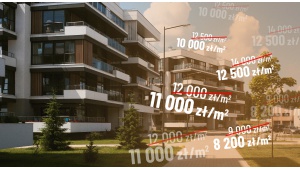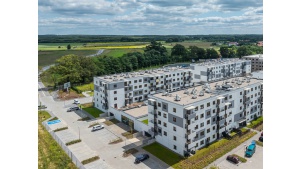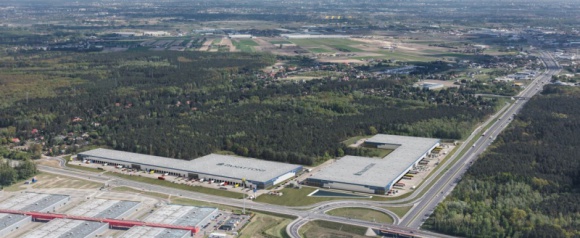IIPROP DELIVERS PROJECT IN SPAIN AND LAUNCHES A NEW DEVELOPMENT IN WARSAW AREA
IIProp (International Industrial Properties), an industrial and logistics platform owned by Madison International Realty and Griffin Capital Partners that is dedicated to investing in key European markets, has successfully delivered the initial phase of its built-to-suit project in the Spanish city of Murcia. The joint venture has also launched a new development project at a prime location in Nadarzyn, Warsaw South, Poland.
IIProp has successfully delivered Phase 1 of its built-to-suit project in Murcia’s San Andres industrial park, totaling 22,346 sqm. This project is set to add another building of over 23,000 sqm, bringing the total development area to 46,600 sqm GLA. Construction of a 23,000 sqm follow-on component is under way and scheduled for completion in January 2023. The project marks an important milestone for the IIProp’s expansion in Spain, where the platform has secured pipeline for development of some 63,000 sqm GLA in the Murcia and Barcelona regions.
The development comes with excellent connectivity and visibility as it sits alongside the A7 highway, part of the Mediterranean transit corridor that links Spanish and Portuguese ports with mainland Europe. The project is set to obtain “Very Good” BREEAM certificate, which will be supported by green solutions such as solar panels, charging stations for electric cars, power sockets for electric bicycles and scooters as well as bicycle parking space and a bee shelter.
The BTS project in Murcia is fully-let to Alfil Logistics, a multimodal logistics operator providing services to the FMCG and F&B industries that is owned by DAMM Group, Spain’s second-largest beer producer, and RENFE, a state-owned rail operator. The premises will be Alfil’s main logistics hub for the region and will serve an extensive distribution network of its Murcia-anchored parent, owner of the “Estrella Levante” brand.
IIProp has also set its sights on the Polish market, where it launched a construction of its new project. The development in Nadarzyn, Warsaw South, is being built in partnership with Panattoni and represents a total development potential for up to 93,500 sqm of GLA. The investment is being delivered in two phases; phase 1 offering 50,000 sqm GLA, is under construction and scheduled for completion in February 2023. Current pre-let on phase 1 of the project amounts to 51%, the space is let to an international logistics operator serving a global leader in home & furniture sector.
The property in Nadarzyn is a prime logistics location - ca. 15-minute drive from Warsaw Chopin Airport and sits along the S8 expressway which provides direct access and excellent visibility. The project is planned to be BREEAM certified at the Excellent level. It will also incorporate numerous enhanced green solutions, including smart energy management systems, twilight sensors for outdoor lighting, a mechanical ventilation system with high-class filters to minimise the concentration and recirculation of pollutants in the building, as well as charging stations for the electric cars.
Nebil Senman, Managing Partner at Griffin Capital Partners, says, “The logistics market in Europe experienced an unprecedented growth during the pandemic and despite the geopolitical turmoil the tenant demand remains strong. We selectively are developing projects in Murcia and Warsaw with highest ESG standards and securing highest tenant covenants to fulfill core investor’s requirements. We plan to continue to build up carefully our European logistics footprint by selectively adding projects in core European markets as well as through converting our well-positioned land bank into standing assets.”
Maciej Dyjas, Managing Partner at Griffin Capital Partners, says, “The projects in Murcia and Warsaw are another success stories in our strategic partnership with Panattoni. We continue to screen new European markets for entry and already begun working on potential development projects in countries like France, Italy and Austria. In parallel, the IIProp’s pipeline stands at ca. 430,000 sqm GLA, despite latest disposals completed in Germany.”

Deweloperzy ukrywają ceny mieszkań. Z troski o klientów czy swoje portfele?

Więcej przestrzeni, mniej hałasu – dlaczego Polacy coraz częściej wybierają przedmieścia?

Jak czytać rzuty mieszkań i uniknąć przykrych niespodzianek? AI ułatwia wybór
Więcej ważnych informacji
 Jedynka Newserii
Jedynka Newserii

 Jedynka Newserii
Jedynka Newserii

Handel

Polskie MŚP otrzymają większe wsparcie w ekspansji międzynarodowej. To cel nowej inicjatywy sześciu instytucji
Firmy z sektora małych i średnich przedsiębiorstw otrzymają kompleksowe wsparcie na potrzeby zwiększania konkurencyjności na arenie międzynarodowej. Taki jest cel wspólnej inicjatywy instytucji zrzeszonych w Grupie PFR pod szyldem Team Poland. Obejmuje ona zarówno wsparcie kapitałowe, w postaci gwarancji, pożyczek czy ubezpieczenia, jak i doradztwo oraz wsparcie promocyjne i informacyjne, dzięki czemu mikro-, małym i średnim firmom łatwiej będzie podjąć decyzję o ekspansji zagranicznej. Pierwszy projekt dotyczy wsparcia dla firm zainteresowanych uczestnictwem w odbudowie Ukrainy.
Bankowość
RPP zgodna co do potrzeby obniżania stóp procentowych. Trwają dyskusje dotyczące tempa tych decyzji

W lipcu Rada Polityki Pieniężnej po raz drugi w tym roku obniżyła stopy procentowe, określając swój ruch mianem dostosowania. W kolejnych miesiącach można oczekiwać kolejnych obniżek, ale ich tempo i termin będą zależeć od efektów dotychczasowych decyzji i wzrostu płac. Docelowo główna stopa procentowa ma wynosić 3,5 proc. Te okoliczności sprzyjają kredytobiorcom.
Handel
Umowa z krajami Mercosur coraz bliżej. W. Buda: Polska nie wykorzystała swojej prezydencji do jej zablokowania

– Polska podczas prezydencji w Radzie UE nie wykorzystała szansy na obronę swoich interesów w sprawie umowy z krajami Mercosur – ocenia europoseł PiS Waldemar Buda. W jego ocenie polski rząd, mimo sprzeciwu wobec zapisów umowy, nie zbudował w UE sojuszy niezbędnych do jej odrzucenia. Porozumienie o wolnym handlu spotyka się przede wszystkim z protestami europejskich rolników, którzy obawiają się zalania wspólnego rynku tańszą żywnością z krajów Ameryki Południowej. Według europosła wszystko może się rozegrać w najbliższych tygodniach.
Partner serwisu
Szkolenia

Akademia Newserii
Akademia Newserii to projekt, w ramach którego najlepsi polscy dziennikarze biznesowi, giełdowi oraz lifestylowi, a także szkoleniowcy z wieloletnim doświadczeniem dzielą się swoją wiedzą nt. pracy z mediami.




![Część środków z Planu Społeczno-Klimatycznego trafi na walkę z ubóstwem transportowym. Organizacje branżowe apelują o zmianę priorytetowych projektów [DEPESZA]](https://www.newseria.pl/files/1097841585/rower3,w_85,_small.jpg)




.gif)

 |
| |
| |
|